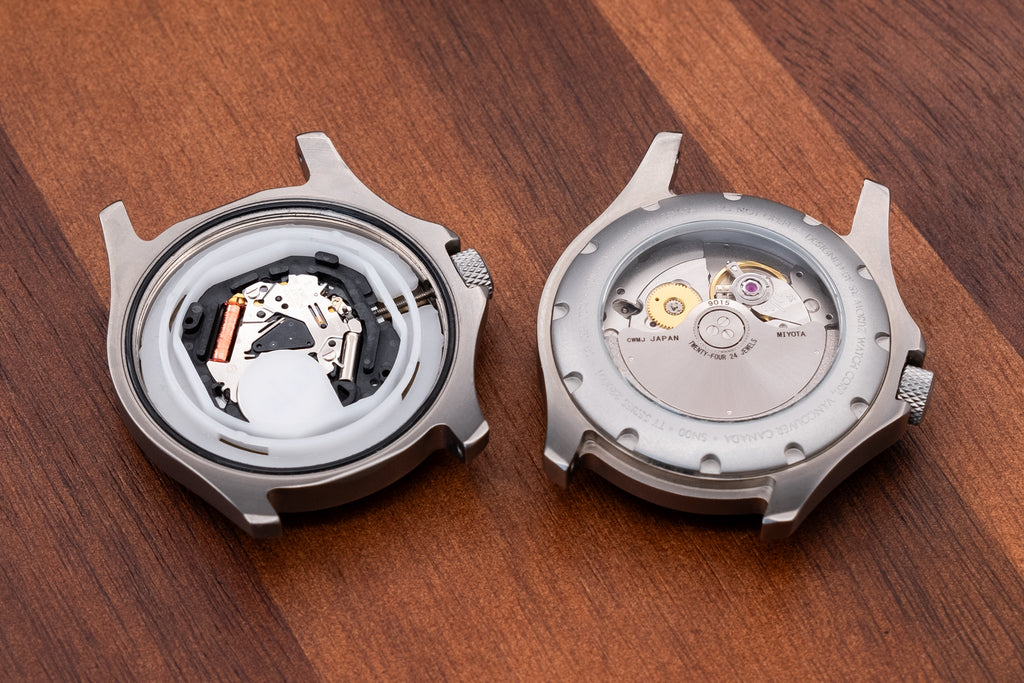When it comes to selecting the perfect timepiece, people often find themselves debating between mechanical vs. quartz watches. Each type of watch offers its own set of advantages and unique characteristics that appeal to different preferences and lifestyles. Understanding these differences is essential to making the right choice for your needs.
What Are Mechanical Watches?
Mechanical watches are marvels of engineering and craftsmanship. They operate without the need for a battery, relying instead on a series of gears and springs to keep time. The two primary types of mechanical watches are manual and automatic:
- Manual Watches: These require the wearer to wind the crown periodically to keep the watch running.
- Automatic Watches: Also known as self-winding watches, these draw power from the motion of the wearer’s wrist.
Mechanical watches are renowned for their intricate mechanisms and artistic value. They often become heirloom pieces due to their durability and timeless appeal.
Pros of Mechanical Watches
- Craftsmanship: Mechanical watches are often handmade with meticulous attention to detail, making them a symbol of luxury and precision.
- Longevity: With proper care and maintenance, mechanical watches can last generations.
- Smooth Movement: The sweeping second hand of a mechanical watch is a hallmark of its sophisticated mechanism.
- Prestige: Owning a mechanical watch is often viewed as a statement of style and status.
Cons of Mechanical Watches
- Maintenance: Mechanical watches require regular servicing to ensure they operate accurately.
- Cost: Due to their intricate design and craftsmanship, they are typically more expensive.
- Accuracy: They are less accurate than quartz watches, with slight time deviations over days or weeks.
What Are Quartz Watches?
Quartz watches, on the other hand, are powered by a battery and use a quartz crystal to maintain precise timekeeping. Invented in the late 20th century, quartz watches revolutionised the watch industry by offering affordable and highly accurate alternatives to mechanical watches.
Pros of Quartz Watches
- Accuracy: Quartz watches are incredibly precise, losing only a few seconds per month.
- Affordability: These watches are generally more budget-friendly compared to mechanical options.
- Low Maintenance: With fewer moving parts, quartz watches require less frequent servicing.
- Variety: Available in a wide range of styles, quartz watches cater to diverse tastes and occasions.
Cons of Quartz Watches
- Battery Dependency: Batteries need to be replaced periodically.
- Lack of Craftsmanship: They lack the intricate design and craftsmanship of mechanical watches.
- Lifespan: Quartz watches typically have a shorter lifespan compared to their mechanical counterparts.
Key Differences Between Mechanical and Quartz Watches
- Power Source – Mechanical Watches (Wound spring or motion) Quartz Watches (Battery)
- Accuracy – Mechanical Watches (Moderate) Quartz Watches (High)
- Maintenance – Mechanical Watches (Regular servicing needed) Quartz Watches (Minimal)
- Cost – Mechanical Watches (Higher) Quartz Watches (Lower)
- Craftsmanship – Mechanical Watches (High) Quartz Watches (Standard)
- Lifespan – Mechanical Watches (Generations) Quartz Watches (Decades)
Which Watch Is Right for Men?
Choosing between a mechanical and a quartz watch for men’s watches depends on your lifestyle, budget, and preferences. Here are some considerations:
Lifestyle and Usage
- Mechanical Watches: Ideal for those who appreciate artistry, heritage, and the legacy associated with traditional timepieces. They suit formal occasions and are perfect for collectors.
- Quartz Watches: Best for men who prioritise practicality and precision. They are great for everyday wear and active lifestyles due to their robustness and accuracy.
Budget
If budget is a concern, quartz watches provide excellent value for money. Mechanical watches, while more expensive, offer long-term value as heirlooms and symbols of luxury.
Maintenance Preferences
Mechanical watches require a commitment to maintenance, which might not suit everyone. Quartz watches are low-maintenance and hassle-free, making them a convenient option.
Why Style Matters
Your choice of watch also says a lot about your personal style. A mechanical watch often exudes sophistication and class, making it a perfect match for formal attire. On the other hand, quartz watches are available in a broader range of designs, including sporty, casual, and ultra-modern looks. Whether you’re heading to a business meeting or a weekend getaway, the right watch can complement your outfit and elevate your overall appearance.
The Appeal of Collectability
For many enthusiasts, mechanical watches are more than just timekeepers; they are collectables. Brands like Rolex, Breitling, and OMEGA are known for producing mechanical watches that appreciate in value over time. Quartz watches, while practical, rarely achieve the same level of collectability, making mechanical watches a preferred choice for those looking to invest in a timeless piece.
Environmental Impact
Another aspect to consider is the environmental impact. Mechanical watches, which do not rely on disposable batteries, are more eco-friendly over the long term. Quartz watches, while energy-efficient, require battery replacements, which can contribute to electronic waste. For eco-conscious buyers, this may tip the scales in favour of mechanical watches.
Making the Right Choice
When selecting between mechanical vs. quartz watches, it’s essential to weigh the pros and cons carefully. Consider your daily activities, personal style, and long-term goals. Are you looking for a watch that will become a treasured heirloom, or do you need a reliable, low-maintenance timekeeper for daily wear? Answering these questions will help guide you to the perfect decision.
Tips for Watch Maintenance
Regardless of your choice, taking care of your watch is crucial to ensure its longevity:
- For Mechanical Watches: Regular servicing by a professional watchmaker is recommended to maintain its intricate mechanism. Store it in a safe, dry place and wind it gently to avoid over-tightening the spring.
- For Quartz Watches: Replace the battery promptly when it runs out to prevent leakage. Clean the watch regularly with a soft cloth to remove dirt and moisture.
The Role of Technology in Modern Watches
While traditional mechanical and quartz watches remain popular, advancements in technology have introduced hybrid men’s or ladies watches that combine features of both. Smartwatches and solar-powered watches are gaining traction, offering features like fitness tracking, GPS, and solar charging. These innovations provide additional options for people seeking multifunctional timepieces, though they may lack the classic charm of traditional mechanical or quartz watches.
Conclusion
Deciding between mechanical vs. quartz watches ultimately comes down to your personal taste and requirements. Whether you value the artistry and legacy of mechanical watches or the precision and convenience of quartz watches, each offers unique benefits. Take the time to explore our extensive collection and find a timepiece that reflects your individuality and complements your lifestyle. With the right watch on your wrist, you’re not just keeping time – you’re making a statement.






